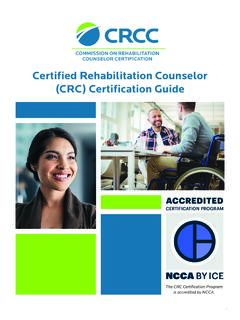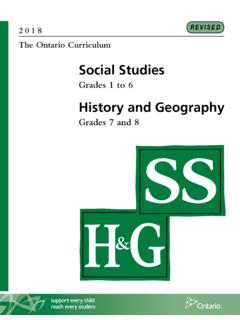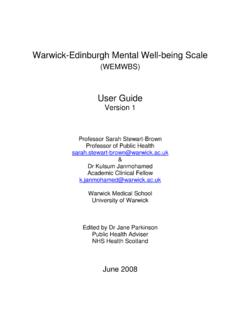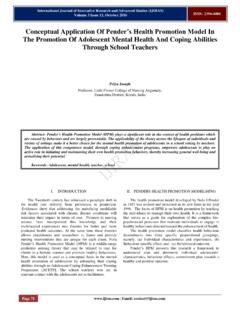Transcription of Health Professional Guide to the SEND Code of ... - GOV.UK
1 0 to 25 SEND code of practice: a Guide for Health professionals Advice for clinical commissioning groups, Health professionals and local authorities February 2016 Contents Foreword 4 About this Guide 6 Expiry or review date 6 Context 6 Principles underpinning the Code of Practice 8 Information, advice and support 9 Working together across education, Health and care for joint outcomes 10 Joint Commissioning 10 The Joint Commissioning Cycle 11 Personal Budgets 12 Transitions from paediatric to adult services 12 The Designated Medical/Clinical Officer 12 Accountability 13 The Local Offer 14 Health in Early Years provision 15 Health in schools and colleges 17 Preparing for adulthood from the earliest years 19 Education, Health and Care (EHC)
2 Needs assessments and plans 20 EHC needs assessments 20 Drawing up an EHC plan 20 Personal Budgets 21 Children and young people in specific circumstances 22 Transfers between CCG areas 22 Children and young people in alternative provision because of Health needs 22 2 Children and young people with SEN who are in youth custody 22 Resolving disagreements 24 Disagreement resolution 24 Mediation 24 Appeals 24 NHS complaints 25 Useful resources 26 Legislation and statutory guidance 26 Other Government information 26 Useful resources and websites 27 Annex A 28 Template letter to inform GPs about patients with a learning disability 28 3 Foreword Our vision for children and young people with special educational needs and disabilities (SEND) is the same as for all children and young people that they achieve well in their early years, at school and in college and make a good transition to adulthood, to lead contented and fulfilled lives.
3 This hasn t always been the case. The SEND reforms introduced by the Children and Families Act 2014 aim to change this, with a focus on two key themes: greater co-operation between education, Health and social care and a greater focus on the outcomes which will make a real difference to how a child or young person lives their life. For too long, Health has been the missing partner in the SEND system. These reforms change that they implement a holistic approach to supporting children and young people with SEND in all aspects of their life. We know that healthy, happy children perform well at school, and we know how significant an impact a child s Health has on their life chances.
4 Many Health professionals and commissioners will already be familiar with the new arrangements through engagement with Pathfinders and Pathfinder Champions which have been piloting new approaches to joint commissioning. Much of the learning from these Pathfinders has gone to inform the 0-25 SEND Code of Practice and this Guide . Health professionals will already be participating in arrangements similar to those in the Code. Close working with education and social care colleagues, early intervention and integrated approaches to supporting the most seriously ill children in society are facilitated by the reforms in the Health and Social Care Act 2012 and the Care Act 2014.
5 The new arrangements in the Children and Families Act are intended to build on such fundamental good practice. 4 This Guide to the Code will help you understand what your duties are under the Children and Families Act 2014 and help you navigate the 0-25 SEND Code of Practice. It will ensure you are doing everything you should be and everything you can, to improve outcomes for this group of children and young people. DR DAN POULTER EDWARD TIMPSON Parliamentary Under-Secretary of Parliamentary Under-Secretary of State for Health State for Children and Families 5 About this Guide This Guide is designed to help clinical commissioning groups1 (CCGs), local authorities and Health professionals understand their statutory duties in relation to the special educational needs and disability (SEND) reforms in the Children and Families Act 2014.
6 It draws out the Health elements from the statutory 0-25 SEN and Disability Code of Practice and will help you navigate the full document. It is not a substitute for the Code of Practice and has no statutory basis. The main duties that CCGs, local authorities and Health professionals must have regard to are highlighted here and links are given to the relevant sections of the Code. It is important that they familiarise themselves with the full version of the statutory guidance in addition to reading this Guide . Expiry or review date This advice will be kept under review and updated when necessary. Context From September 2014, the Children and Families Act 2014 provides for.
7 A clear, transparent local offer of services across education, Health and social care with children, young people and parents involved in preparing and reviewing it services across education, Health and care to be jointly commissioned Education, Health and Care (EHC) plans to replace statements and Learning Difficulty Assessments (LDAs) with the option of a Personal Budget for families and young people who want one new statutory rights for young people in further education, including the right to request a particular institution is named in their EHC plan and the right to appeal to the First-tier Tribunal (Special Educational Needs and Disability)
8 , and a stronger focus on preparing for adulthood, including better planning for transition into paid employment and independent living and between children s and adult s services A child or young person has SEN if they have a learning difficulty or disability which calls for special educational provision to be made for him or her. Children and young people who have SEN may also have a disability under the Equality Act 2010. 1 By clinical commissioning groups we also mean NHS England when acting as a commissioner of Health services 6 Clinicians and therapists already provide Health services for children and young people with SEND, from early identification, throughout their school and college years and into the transition to adulthood.
9 Much of the Health care for children and young people will be delivered through universal, preventative services. There will be times when adaptations are required for some pupils in mainstream settings and targeted delivery may be required for the few with EHC plans. From September 2014 CCGs must: commission services jointly for children and young people (up to age 25) with SEND, including those with Education Health and Care (EHC) plans work with the local authority to contribute to the Local Offer of services available have mechanisms in place to ensure practitioners and clinicians will support the integrated EHC needs assessment process, and agree Personal Budgets where they are provided for those with EHC plans The reforms are focused on enabling children and young people to achieve the best they can, with an emphasis on outcomes rather than processes.
10 CCGs and local authorities have considerable freedom in how they work together to deliver integrated support that improves children and young peoples outcomes. Outcomes are the benefit or difference made as a result of an intervention at three levels: Individual outcomes such as might be set out in an EHC plan: Martha can communicate and play independently with her friends at playtime Service level outcomes: paternal mental Health has improved in 10 families Strategic outcomes: there has been a 10% increase in young people supported into employment and independent living The Council for Disabled Children have developed a model for thinking about outcomes which can be found at Appendix 6 of the SEND pathfinder information pack on the EHC plan needs assessment process.
















